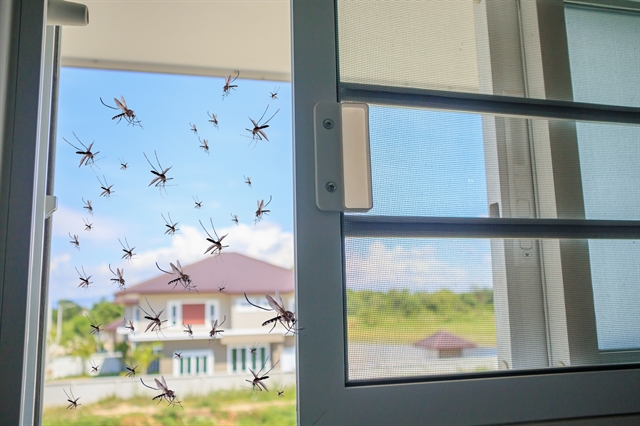 Society
Society

 |
| Guest speakers at the talk show. — Photos provided by the agency |
HÀ NỘI — Health experts warn that dengue fever is becoming increasingly difficult to predict in terms of timing and outbreak scale. They caution that patient negligence or improper management of the illness can result in rapid deterioration and, in severe cases, death.
Dengue fever becomes increasingly unpredictable
According to the Ministry of Health, Việt Nam recorded 22,974 cases and five deaths related to dengue across multiple provinces in the first five months of 2025. This indicates that risk remains high, especially as dengue now overlaps with other health threats such as hand-foot-and-mouth disease and COVID-19, which are on the rise in certain localities.
In response, an urgent directive was issued by the ministry at the end of May, calling for intensified leadership, enhanced surveillance, and improved communication to prevent further dengue-related fatalities.
Experts note that dengue used to follow a five-year outbreak cycle with distinct quiet periods. However, the current epidemiological trend shows that outbreaks are no longer confined to specific seasons and have expanded in both frequency and geography.
These concerns were highlighted during a recent online talk show hosted by Sức khỏe & Đời sống - the ministry’s official media outlet - in partnership with Takeda Vietnam Pharmaceuticals Limited. The event, titled “Towards Zero Dengue Deaths: Collective Disease Prevention with Integrated Solutions,” aimed to raise public awareness and promote coordinated efforts in tackling the disease.
At the talk show, MSc. Dr. Võ Hải Sơn, Deputy Director of the Viet Nam Administration of Disease Prevention, Ministry of Health, said: “Previously, high case numbers followed a cycle of about five years, but now it has changed, and high case numbers appear roughly every two years”.
Dr. Sơn attributed the shift to factors such as rapid urbanisation, increased migration, and greater mobility between regions, all of which have contributed to a broader and more difficult-to-control spread of the disease.
Assoc. Prof. Dr. Phạm Quang Thái, Vice head of Infectious Diseases Control Department at the National institute of Hygiene and Epidemiology, said from an epidemiological perspective, dengue fever has now expanded its reach to provinces that previously reported few or no cases, including mountainous regions.
“This development highlights the urgent need for everyone to become more proactive in dengue prevention and response,” he said.
Patient negligence and mismanagement continue to cause severe outcomes
While public awareness of dengue fever has generally improved, health experts warn that a significant portion of the population remains negligent and mismanages the illness, leading to cases of late hospitalisation, severe disease progression, and even death.
Assoc. Prof. Dr. Đỗ Duy Cường, Director of Bạch Mai Institute of Tropical Medicine, pointed out common misconceptions and errors in early response.
“People often mistake early dengue symptoms for more common illnesses like the flu. In some cases, symptoms are not obvious, which causes patients to delay hospital visits. By the time they arrive, they may already be in shock or suffering from multiple organ failure,” he said.
 |
| Misinterpretation of symptoms causes many people to self-treat at home, missing the "golden period" for intervention and facing unpredictable risks. |
Dr. Cường also shared a typical case, highlighting the consequences of delayed care. A male university student from the countryside, living in rented accommodation in Hà Nội developed a fever but chose to stay in his room and self-manage due to poor living conditions. He ate poorly and did not seek medical attention. By the fifth day, his condition had worsened significantly. When finally admitted to the hospital, he was already showing signs of shock and hemoconcentration.
Dr. Cường further emphasised that dengue is caused by a virus and has no specific antiviral treatment. The unauthorised use of antibiotics, corticosteroids, or IV fluids without a doctor’s prescription is a serious mistake that can worsen the illness.
Ramping up comprehensive efforts to achieve zero dengue deaths
To cope with the increasingly complex dengue epidemiology, reduce fatalities, and effectively control outbreaks, health experts are calling for a comprehensive strategy including vector control, epidemiological surveillance, early warning systems, behavioural communication, and strengthening of the health system. Among these, vaccination - a new solution endorsed by WHO - is a part of the overall strategy, enabling proactive prevention and reducing the risk of severe disease progression.
Dr. Sơn stressed the critical role of vector control combined with proactive community involvement. “Social measures, together with the efforts of localities, neighbourhoods, and households, will raise awareness of dengue risks. Coordinating with the health sector to eliminate mosquito larvae and promote the use of bed nets and mosquito-killing devices are key factors in controlling the disease and its vectors,” he said.
Adding to the discussion on vector control, Dr. Thái highlighted the unexpected challenges posed by urban environments. “Some residents believe that living on the 30th floor protects them from mosquitoes because they don’t see any. However, mosquitoes are very clever. They don’t fly directly from the ground to the top floors but move upward gradually, breeding on each floor. This means that even apartments on the highest floors can be affected by mosquitoes,” he explained.
 |
| High-rise apartment buildings are not “safe zones” for dengue. Mosquitoes will still breed and transmit dengue disease if not properly controlled. |
From the perspective of an enterprise accompany Việt Nam’s health system, Benjamin Ping, General Manager of Takeda Viet Nam Pharmaceuticals Limited, affirmed: “We believe that multi-sectoral collaboration plays a key role, because no single unit or organisation can effectively control dengue alone”.
He also emphasised the necessity of cooperation among the government, the health sector, businesses, and the community.
"Takeda is committed to contributing to collective efforts by strengthening healthcare system capacity, supporting community communication, and ensuring sustainable access to vaccination as an integral part of the disease control strategy," he said.
Additionally, the role of health education communication is indispensable. It is necessary to implement diverse, official, and continuous campaigns to raise community awareness, help people understand the disease correctly, recognise early symptoms, avoid negligence, and seek medical care in time.
In addition, vaccination is also considered one of the proactive preventive solutions, helping to reduce severe cases and fatalities caused by dengue.
WHO is currently recommending the use of Takeda’s dengue vaccine for certain populations in countries with high transmission rates and significant dengue burden. This vaccine has been approved in 40 countries, with over 15 million doses distributed globally./.
Disclosure
This content was jointly developed by Takeda Viet Nam Pharmaceuticals Limited and has been professionally reviewed and approved by the Vietnam Association of Preventive Medicine with the aim of raising public awareness. It is intended solely for public informational purposes and should not be used for the diagnosis or treatment of any health condition. This material is not a substitute for professional medical advice. Please consult your physician for further guidance. C-ANPROM/VN/NON/0034
References
From the Department of Preventive Medicine, provided by SK&ĐS Newspaper Vaccines and immunisation: Dengue




